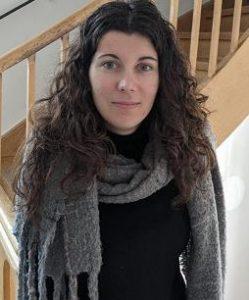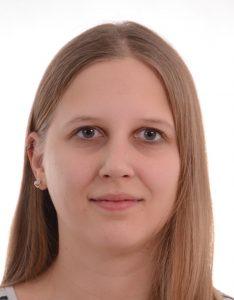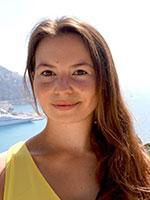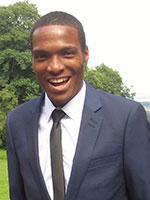Immunopaedia Ambassadors – Europe
Our Ambassadors from across Europe.
 What is your name?
What is your name?
Anna Salamero Boix
What is your current position?
Doctoral student
Which institute and country do you work in?
Georg-Speyer-Haus. Institute for Tumor Biology and experimental Therapy, Frankfurt am Main, Germany
What is your home country?
Spain
What are your research interests?
Immunology, Brain, Cancer
Tell us about yourself and your research interests:
I am a doctoral student focusing on tumor microenvironment, with a specialization in brain tumor immunology, at Georg-Speyer-Haus, Frankfurt am Main. The aim of my current studies is to find new strategies to revert immune suppression in brain metastasis. In my project, we explore different ways of targeting the immune system in combination with radiotherapy with the ultimate goal to control tumor growth and improve the prognosis of brain metastatic patients. I hold a Bachelor’s Degree on Biomedical Sciences at University of Lleida, Spain, and a Master’s Degree on Molecular Biomedicine at Autonomous University of Madrid.
What are your online profiles?
LinkedIn: Anna Salamero Boix
Twitter: @asalboix
ResearchGate: Anna Salamero Boix
Imunology Keywords:
Immunotherapy, Microglia/Macrophages, T cells
 What is your name?
What is your name?
Yasamine El Ahmadi
What is your current position?
Postdoctoral Fellow
Which institute and country do you work in?
“Infectious Diseases Models for Innovative Therapies” (IDMIT) Research Center, Paris, France
What is your home country?
Morocco
What are your research interests?
Immunology, Vaccines, infection
Tell us about yourself and your research interests:
My interest in the mechanisms of the response of immune cells quickly guided my choices during my university studies. I completed my PhD in immunology at the University of Montpellier in IRMB. I was focused on the characterization of the phenotype and function of regulatory T cells (Treg) in the context of rheumatoid arthritis (RA). I was able to characterize subpopulations of Treg and Thelper cells from blood and synovial fluid of RA patients. In July 2011, I joined the IDMIT structure at CEA as a postdoctoral fellow under the direction of Dr Roger Le Grand. The objective is to study the effects of vaccination in the context of SARS CoV2 infection. This study project allowed me to build my technical and scientific skills by opening to a new field, that of viral diseases.
What are your online profiles?
LinkedIn: Yasamine El Ahmadi
Twitter: @AhmadiYasamine
Imunology Keywords:
Immune response, T cells, Vaccination
 What is your name?
What is your name?
Dounia Chraa
What is your current position?
Post-doc Researcher
Which institute and country do you work in?
Cancer and Functional Genomic, France
What is your home country?
France
What are your research interests?
Melanoma, Immunotherapy, Immunosuppressive microenvironment
Tell us about yourself and your research interests:
I am a postdoctoral researcher in the team of Dr Mei LI (Research Director), Functional Genomics and Cancer Unit, of the institute of Genetics and Molecular and Cellular Biology Holding. I am holding a PhD in Immunology-Oncology “Aix Marseille University” , “Hassan II University “. I am mainly interested in Immuno-oncology field and currently working in deciphering the role of TSLP a cytokine produced by keratinocytes, in the regulation of immune T cells response in cutaneous melanoma.
What are your online profiles?
Linkedin – Dounia Chraa
Imunology Keywords:
T cells, Immune response, Immune suppression
 What is your name?
What is your name?
Jasmin Knopf
What is your current position?
Post-doctoral fellow
Which institute and country do you work in?
Department of Medicine 3, Universitätsklinikum Erlangen, Germany Director: Prof. Dr. Georg Schett, Germany
What is your home country?
Germany
What are your research interests?
Neutrophil biology, Neutrophil Extracellular Traps (NETs), Antibody glycosylation
Tell us about yourself and your research interests:
My background is non-academic and I was the first in my family to study at a university. I studied Molecular Medicine and since the beginning, I was interested in biology and the immune system in particular, in a more clinical setting. Therefore, I became a scientist in the field of Rheumatology and Immunology. I’m especially interested in the role of Neutrophil extracellular traps (NETs) in autoimmune and chronic inflammatory diseases, such as Systemic Lupus Erythematosus or Rheumatoid Arthritis. Currently, I focus on the composition and degradation mechanisms of NETs and how they can change the effector functions of antibodies and other proteins, e.g. by the modification of cellular glycosylation. Additionally, I’m researching the role of NETs in COVID-19. There is evidence that NETs and NET-derived proteins are not only responsible for thrombus formation in these patients but also might modify the spike protein. Finding a way to treat or even prevent vascular occlusions by NETs may also be applicable to other diseases with vasculopathies (as e.g. described for Malaria).
Furthermore, I want to help educate and guide young people, and promote research opportunities for students from all over the world.
What are your online profiles?
Linkedin, ResearchGate
Imunology Keywords:
Neutrophils, Neutrophil Extracellular Traps (NETs), COVID-19
 What is your name?
What is your name?
Maria-Bernadette Madel
What is your current position?
Postdoctoral Associate
Which institute and country do you work in?
Baylor College of Medicine, Houston, Texas, USA
What is your home country?
Germany
What are your research interests?
Osteoimmunology, Inflammatory Disorders, Ageing
Tell us about yourself and your research interests:
After my studies in Molecular Medicine at the Medical University of Innsbruck, Austria, I completed my PhD in Immunology and Microbiology with a focus on Osteoimmunology at the University of Côte d’Azur in Nice, France, under the supervision of Dr. Claudine Blin. During my PhD studies, I was focusing on osteoclast heterogeneity and the characterization of inflammatory osteoclasts in order to understand how they contribute to different inflammatory processes and how they could be targeted to limit inflammatory bone destruction. In 2020, I joined the team of Dr. Florent Elefteriou at the Department of Orthopedic Surgery at Baylor College of Medicine in Houston, Texas, USA, where my current focus is on identifying the role of the autonomic nervous system in age-related bone loss.
What are your online profiles?
Linkedin – Maria-Bernadette Madel
Researchgate – Maria-Bernadette Madel
Twitter: @MB__Madel
Imunology Keywords:
Osteoclasts, Chronic Inflammation, Autoimmune Diseases
 What is your name?
What is your name?
Fabien Ulrich Prodjinotho
What is your current position?
Postdoctoral researcher
Which institute and country do you work in?
Institut für Medizinische Mikrobiologie, Immunologie und Hygiene (IMMIH), Technische Universtät München (TUM), Munich, Germany
What is your home country?
Benin
What are your research interests?
Infections with helminths, immunoregulation, parasitology
Tell us about yourself and your research interests:
I completed my Master degree in 2008 at the University of Abomey-Calavi (Benin) with the focus on the cellular and humoral markers in relation with diabetes. When completing my Master degree, I developed a keen interest and passion for research on helminth infections, specially the immunological and molecular mechanisms associated with these infections. This led me to the University of Lome (Togo), where, for my Postgraduate degree in 2009, I investigated the importance of the use of active molecules from medicinal plants against helminth infections. After my Postgraduate degree, I served as research assistant from 2010 to 2012 at the University of Abomey-Calavi. In 2013, I was awarded a scholarship by the German Academic Exchange Service (DAAD) and financial support from the BONFOR research committee for a PhD in Immunology and Parasitology at the Institute of Medical Microbiology, Immunology and Parasitology of the University of Bonn (Germany). I completed my PhD thesis in January 2017 on the regulation of effector immune mechanisms during helminth infections and the particular role of the antibody IgG4. Currently I am a postdoctoral researcher at the Institute of Medical Microbiology, Immunology and Hygiene at the Technical University of Munich (Germany).
What are your online profiles?
ANSA ev – Fabien Prodjinotho
LinkedIn – Fabien Prodjinotho
Facebook Page – WestAfricanYoungImmunoInvestigators
Immunology Keywords: Infections with helminths, immunoregulation, IgG4










